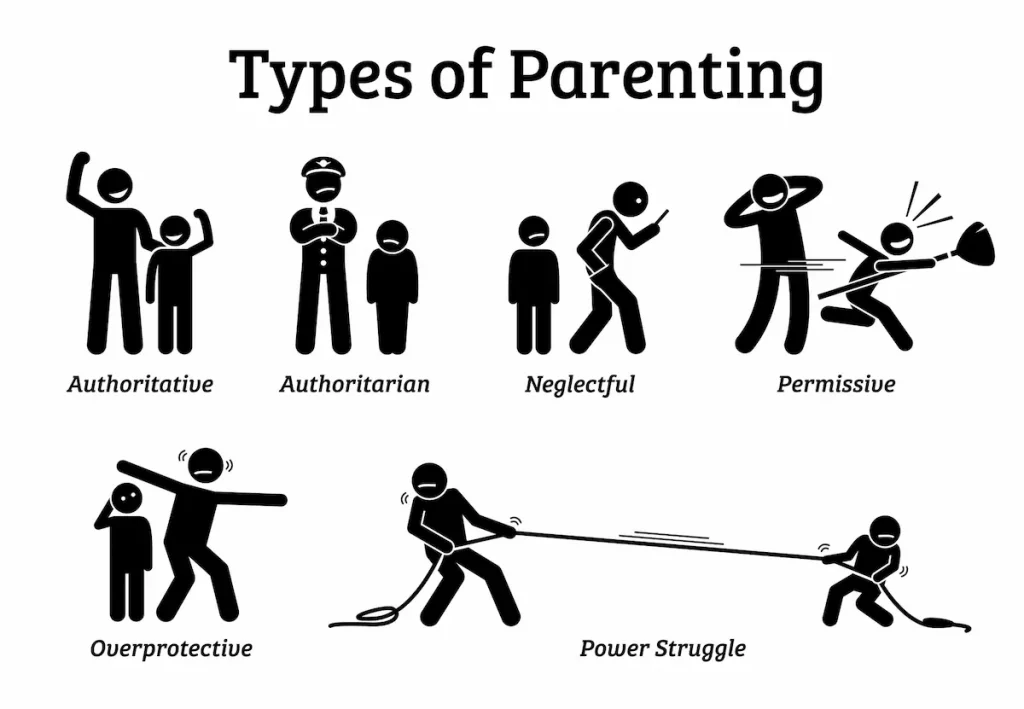Even though no two families are identical, experts have found similar parenting styles. Generally, these parenting strategies focus on the quantity of support parents offer and the level of control they exhibit. And while most have positives and downsides, some are typically deemed healthier for children than others. But what about coercive parenting? What is it, and is it as bad as we’ve heard?
Coercive parenting is harsh parental conduct that includes criticizing, intimidating, beating, screaming, and psychological control to compel a child’s obedience. Negative orders, verbal abuse, blatant acts of rage, and physical abuse are also common among coercive (or authoritarian) parents.
If you are worried that you may be a coercive parent or would like to learn more about the subject, you have come to the right place. This article will discuss coercive parenting, why it is unhealthy, what it does to children, and how you can change your parenting style to help your children instead of damaging them.

Coercive Parenting: The Worst Parenting Style?
There are a lot of negative connotations regarding coercive parenting and with good reason. Coercive parents are known to be extremely nosy and demanding and impose higher authority over their children. Coercion is frequently irrational and overbearing.
The preservation of hierarchy disparities is more important to coercive parents than managing their children’s behavior calmly and safely. Coercive parenting is slightly different than authoritative parenting, which uses discussion, negotiating, and a result-orientated approach to demand compliance. Coercive parenting is harsh and contradictory.
Although it may appear paradoxical, these forceful parents are known for their hardness and unpredictability. Coercive parents are extremely unpredictable in their reactions to children’s disobedience, but once they do, they repeat their destructive verbal abuse and reimpose their hierarchical status.
What Effect Does Coercive Parenting Have On Children?
Many parents place a high value on their children’s obedience as a kind of discipline. A parent’s role is to instill in their children a sense of social responsibility by guiding them in the right direction. Parents use various methods to achieve this aim, though not all of them achieve the desired outcomes.
Kids learn to cooperate when their parents are attentive, caring, and consistent. These parents can better get their kids to cooperate if they follow these guidelines. Unnecessary resistance is generated by parents who use coercion, resulting in rebellious conduct rather than obedience.
These early encounters may permanently alter a person’s physiology, brain, and personality. Children’s emotional control and prosocial growth are hindered by harsh parenting. A child’s ability to self-soothe and concentrate can be improved by parental guidance and modeling.
It Can Lead To Behavioral Disorders
Parental dysregulation can be modeled by parents who regularly show unpleasant, hurtful, and aggressive emotions. Aggressive behavior in preschoolers is strongly linked to parental coercion. Aggressive behavior by preschoolers can lead to conduct disorder, antisocial behavior, and Oppositional Defiance Disorder (ODD).

They Start To Rebel Against The Law
Children raised in a household where their parents were severe are more likely to engage in delinquent and illegal acts as adults. Depressive disorders and drinking can also develop as a result of coercion.
It May Cause Depression & Other Mental Disorders
Physical punishment has been linked to a wide range of long-term psychological impacts on children, including despair, anxiety, suicidal thoughts in adulthood, and abusive behavior towards their own children. Not only does coercive parenting not work, but it also harms a child’s brain growth and future consequences.
They Develop Unhealthy Social Skills
Adults raised under forceful parenting seem to be more likely to have issues in the workplace, difficulty sustaining an intimate connection, social issues, and a lower probability of getting a higher-level job or salary. Some parents may believe their attempts to control their children are beneficial to them.
They may also have realized that, at least temporarily, they can get the conformity they desire through intimidation and manipulation. Psychologically forceful parenting may be just as destructive to a child’s mind as physical pressure.
They Become People Pleasers
Kids may learn how to act nicely merely to keep their parent’s attention and affection, but not because they have developed a sense of right and wrong. These children have a tough time developing internal control since they are focused on attempting to conform to the psychological demands of their parents.
As a result, they have a tough time adjusting to maturity since they do not learn how to control their emotions, thoughts, and actions independently. Misbehavior and bullying can result from extreme psychological control, such as screaming and criticism.
Children Become Manipulative & Abusive
Smiling and shaming can persuade youngsters to become verbally abusive and manipulative, as well as withholding affection and utilizing guilt. “Mean girl” syndrome, when females become manipulative and mentally punitive against other girls, can be caused by mentally dominating parents.
Authoritarian parenting can sometimes take the shape of being too protective of one’s family. Overprotective parents exacerbate fear and detachment in children. As a result, the youngster is unable to develop the necessary social skills and lacks the resources to do so successfully in the future.

Better Alternatives To Coercive Parenting
According to the experts, there is no such thing as perfect parenting, and most parents, at some point, employ psychological control over their children. As parents, we may help our children develop healthy self-esteem and self-regulation by being more conscious of our coercive impulses and attempting to limit them.
An authoritative, faith-centered parenting style that emphasizes unconditional love and support while still setting acceptable expectations and holding children accountable for their actions is recommended as a countermeasure to psychological and physical control.
Adults must provide small but steady doses of autonomy for children as they learn to make wise decisions. They claim that parents who have difficulty allowing their children to make decisions can do several things to improve. These include
Parental Attribution
The number of emotional tension children experience as a result of their parents’ assessment of their conduct is highly variable.
Rather than resentful or upset, parents with a firm grasp of age-appropriate conduct and the flexibility to examine different reasons for their child’s actions are more likely to stay interested and open-minded.
Emotional Regulation
Coercive parenting is characterized by a lack of control over one’s own emotions. Managing one’s emotions effectively can provide a protective barrier between the stress of dealing with a challenging child and one’s own emotional overreaction.
Strict parents typically adopt coping mechanisms to cope with their unpleasant feelings, including denial and mental detachment. Employ positive reinterpretation to think about the issue in a new way.
Give Your Children Options
As far as possible, allow your children to make their own decisions rather than telling them what to do. Consider letting your kid pick from a menu of three veggies rather than making threats of retribution if he doesn’t consume his vegetables.
Be Aware Of Your Body Language
Keep an eye on your body language. Try getting closer to your kid if you find yourself moving away when he does something that annoys you. Make sure to keep facing your children if you notice you tend to turn away from them.
If you stick with it, you’ll find it easy to use a more friendly tone.
Practice Positive Parenting Techniques
Positive parenting methods assist parents in better controlling their children’s conduct and fostering a calmer home environment. In addition to reducing the need for severe punishment, improved parenting skills provide parents with a greater sense of self.

Conclusion
Physical coercion is clearly out of the question, but many parents are unaware of the detrimental effects of mental control. When children defy their parents’ wishes, they are more likely to be punished. Your youngster may do the make-up instead.
Individuals perform a make-up to repair the relationship with the person who breached the agreement. Allow your children to practice forgiveness and remorse by letting them apologize for things they have done that were wrong. This puts respect and trust back into the relationship.

